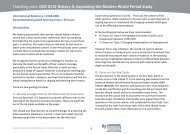MIGRATION
OCR-A-Migration-sample-chapter
OCR-A-Migration-sample-chapter
Create successful ePaper yourself
Turn your PDF publications into a flip-book with our unique Google optimized e-Paper software.
5.4 Review: English control<br />
5 The three kingdoms: England, Ireland and Scotland<br />
5.4 Review: English control<br />
REVIEW TASKS<br />
You will need to explain how the English controlled Ireland and Scotland and<br />
assess the impact this control had on those countries. You will also need to make a<br />
judgement using contemporary sources and your own knowledge.<br />
1 Copy and complete the table below, using as much detail as you can.<br />
Ireland<br />
Scotland<br />
How the English<br />
gained military<br />
control<br />
How the English<br />
gained political control<br />
How the English gained<br />
economic control<br />
Compare the ways in which the English gained military control of Ireland and<br />
Scotland. Do the same for political and economic control.<br />
2 Copy and complete the table below using as much detail as you can.<br />
Ireland<br />
Scotland<br />
Social impact of<br />
English rule<br />
Political impact of<br />
English rule<br />
Economic impact of<br />
English rule<br />
Do you think England had a largely positive or negative impact on Ireland and<br />
Scotland during this period?<br />
3 ‘By 1730, English control of the British Isles was largely successful.’ Do the<br />
sources in this chapter and your own knowledge convince you that this statement<br />
is true?<br />
KEY TERMS<br />
Make sure you understand these key terms and can use them<br />
confidently in your writing.<br />
l Act of Union<br />
l Ascendancy<br />
l Highlanders<br />
l Jacobites<br />
l Lowlanders<br />
l plantations<br />
l Wars of the three Kingdoms<br />
Uncorrected proof<br />
Migration links<br />
You already know about the tax on foreigners in the late Middle Ages, when<br />
those born outside the king’s realm were classed as ‘aliens’. However, even<br />
though English kings asserted their rule over Ireland, the Irish in England<br />
were counted as aliens and taxed. From medieval times their status in English<br />
eyes was therefore as colonised people – invaded and then controlled and<br />
treated as inferior – rather than equal citizens.<br />
In the seventeenth century, the Irish were already being portrayed as slaves,<br />
cowards and ‘weeds’. These dehumanising, racist attitudes would worsen in<br />
the nineteenth and twentieth centuries, when poverty forced mass migration<br />
to England.<br />
Loss of land and harsh laws aimed at Catholics forced many more poorer Irish<br />
people to emigrate across the Atlantic. The potato crop, seen as a lifesaver in<br />
the 1700s, would be a major cause of famine and mass migration in the 1840s<br />
(see Topic 3.3).<br />
The attacks on the Scottish Highland way of life that began in this period<br />
intensified over the next century and ended with the Clearances in the<br />
mid nineteenth century that emptied the land of people and forced mass<br />
emigration to Scottish and English industrial cities.<br />
Impact on today’s world<br />
Ireland is still deeply affected by the events of the 1690s. The divisions<br />
between the majority Protestant north and the mainly Catholic south remain.<br />
In Northern Ireland, although political power is shared, tension remains<br />
between the mainly Protestant Loyalists, who want to remain in the UK,<br />
and largely Catholic Nationalists, who want a united Ireland. On 12 July<br />
each year, the anniversary of the Battle of Aughrim, Ulster Protestants<br />
commemorate the Williamite victory with marches led by the Orange Order,<br />
an Ulster Protestant organisation named in William’s honour. Disputes over<br />
the naming of (London)derry continue.<br />
After the defeat of the Scottish rising in 1715, one more Jacobite rebellion in<br />
1745 failed and resulted in the total defeat of the Highland clans. Their way<br />
of life has gone and the once populated glens and hills are largely empty of<br />
people. Much of the Highlands and Islands still belongs to absentee private<br />
landowners. Scotland remains part of Great Britain and the Act of Union is<br />
still intact. However, Scotland now has its own parliament again, and the<br />
Scottish Nationalists – who want independence – are by far the strongest<br />
party in Scotland.<br />
162<br />
163



